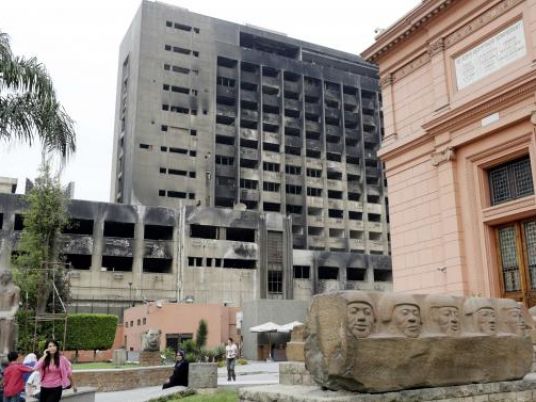The National Democratic Party's (NDP) sweeping election victory this week may seem, at a first glance, like a triumph for the ruling party. However, if one looks beyond the headlines it appears the NDP may be a primary loser in the wake of last week’s polls.
The NDP’s landslide victory, which has secured it 93 percent of the seats in parliament, is not without its costs. Moving forward, the ruling party now faces three dilemmas, which its leaders are well aware of but nonetheless have chosen to ignore.
The first dilemma is the NDP’s loss of credibility. After decades of promising the Egyptian people fair elections, the vote was as fraudulent as many expected. It failed to meet even the minimum standards of legality and political decency, as evidenced by the many reports, testimonies and lawsuits following the results.
The opposition parties, which were promised seats by the NDP at the expense of the Muslim Brotherhood, will no longer believe the NDP’s stated commitments to reform and integrity. Instead, they now stand on the same plane as the public, which lost its trust in the government long ago.
The NDP’s second dilemma is a structural one. Egypt’s current multi-party political system has its roots in former President Anwar al-Sadat introduction of three formal parties in 1976, which were meant to represent the right, centre and left. Under President Hosni Mubarak, this system was adjusted into what Egyptian political analysts have called a “restricted multiparty system”–a strong ruling party surrounded by small, ineffective opposition parties that do not present any real competition but give the system a semblance of democracy.
In its recent drive to control parliament, the NDP stomped on this multiparty system, which the regime previously used to present a positive image to the outside world. Egypt has now adopted a “single party system” much like Syria or Iraq during Saddam Hussein's reign.
The third dilemma the NDP faces is a legitimacy deficit. Going into these elections, the Egyptian regime had an urgent need to reclaim its legitimacy, lost since the Egyptian government deviated from the path set out by the original leaders of the 1952 revolution. Meanwhile, the NDP has been unable to tap into other sources of legitimacy, such as hereditary rule or concrete achievements that satisfy the Egyptian public.
The regime has attempted, at times, to build “constitutional legitimacy” through limited political reforms sponsored by Gamal Mubarak and his supporters in the NDP. Such efforts have failed to encourage public participation in elections as many people remained unconvinced by government propaganda that the elections would be free and fair.
Voter turnout this year was no more than 12 percent, in other words, three million out of the total population of 80 million. Most of those who turned up voted in favor of the NDP (including votes that were rigged). This number is totally insufficient to market the legitimacy of a political system the regime wishes to preserve.
The legitimacy, credibility and structural dilemmas that the ruling party faces undermine any gains it has secured after its sweeping election victory.
Translated from the Arabic Edition.



